Healthy Ageing Assessment Report - Nursing Module, Semester 1
VerifiedAdded on 2022/11/13
|12
|3462
|361
Report
AI Summary
This report presents a comprehensive health assessment of an 80-year-old man, Mr. Jack, focusing on his life history, health issues, and perceptions of ageing. The assessment includes a narrative summary detailing his medical history, current health conditions, and medications. Mr. Jack's views on ageing are analyzed using an Age Perception Tool, revealing his belief that old age is synonymous with ill health and dependency. The report highlights significant areas of concern, including psychological distress, inability to perform Activities of Daily Living (ADLs), and mild dementia. The evaluation contrasts Mr. Jack's condition with the concept of healthy ageing, identifying discrepancies and outlining measurable goals and nursing interventions. These interventions address Mr. Jack's inability to perform ADLs, mild dementia, and psychological distress, providing rationales for each. The report underscores the importance of tailored care plans and interventions to improve the quality of life for older adults.
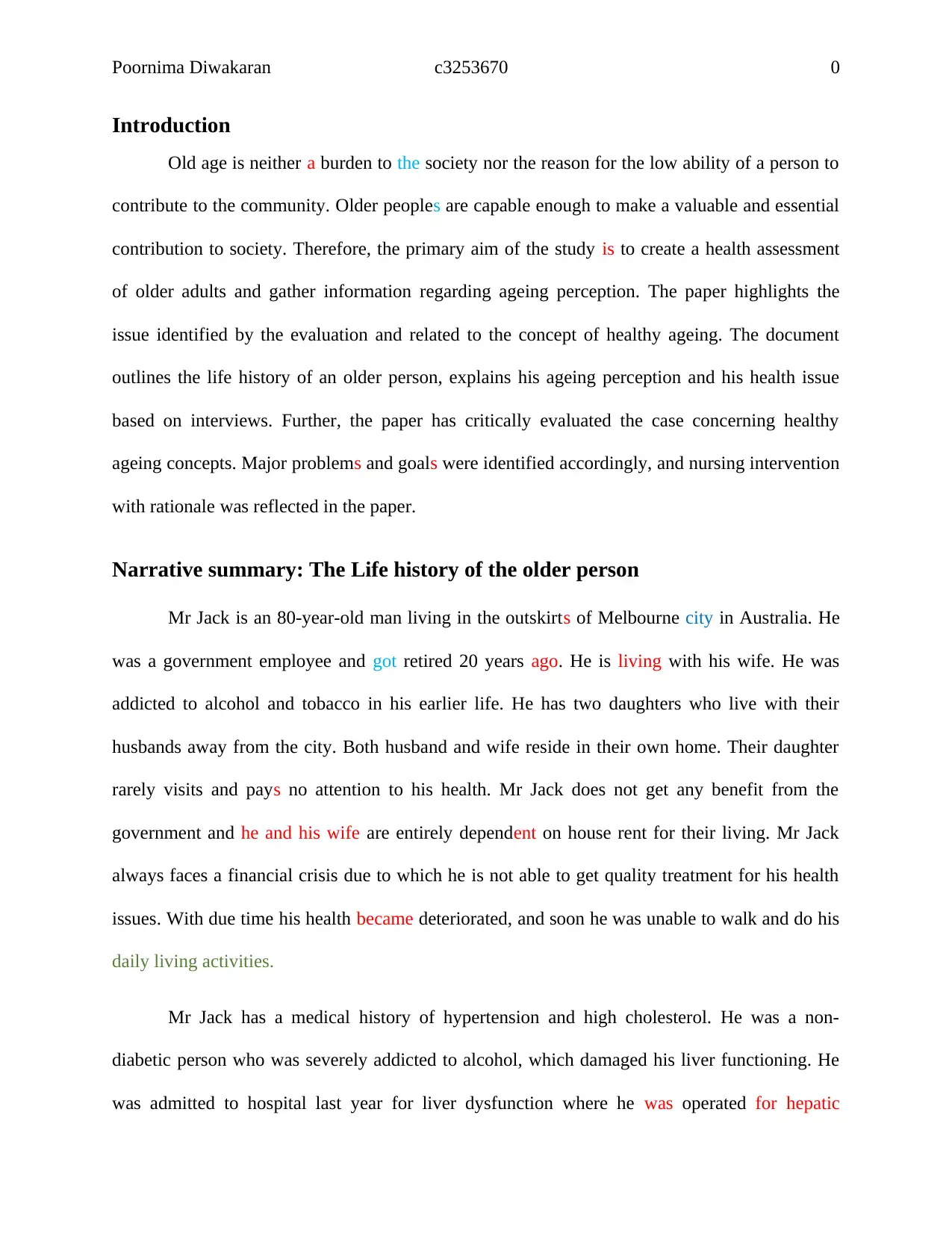
Poornima Diwakaran c3253670
Introduction
Old age is neither a burden to the society nor the reason for the low ability of a person to
contribute to the community. Older peoples are capable enough to make a valuable and essential
contribution to society. Therefore, the primary aim of the study is to create a health assessment
of older adults and gather information regarding ageing perception. The paper highlights the
issue identified by the evaluation and related to the concept of healthy ageing. The document
outlines the life history of an older person, explains his ageing perception and his health issue
based on interviews. Further, the paper has critically evaluated the case concerning healthy
ageing concepts. Major problems and goals were identified accordingly, and nursing intervention
with rationale was reflected in the paper.
Narrative summary: The Life history of the older person
Mr Jack is an 80-year-old man living in the outskirts of Melbourne city in Australia. He
was a government employee and got retired 20 years ago. He is living with his wife. He was
addicted to alcohol and tobacco in his earlier life. He has two daughters who live with their
husbands away from the city. Both husband and wife reside in their own home. Their daughter
rarely visits and pays no attention to his health. Mr Jack does not get any benefit from the
government and he and his wife are entirely dependent on house rent for their living. Mr Jack
always faces a financial crisis due to which he is not able to get quality treatment for his health
issues. With due time his health became deteriorated, and soon he was unable to walk and do his
daily living activities.
Mr Jack has a medical history of hypertension and high cholesterol. He was a non-
diabetic person who was severely addicted to alcohol, which damaged his liver functioning. He
was admitted to hospital last year for liver dysfunction where he was operated for hepatic
0
Introduction
Old age is neither a burden to the society nor the reason for the low ability of a person to
contribute to the community. Older peoples are capable enough to make a valuable and essential
contribution to society. Therefore, the primary aim of the study is to create a health assessment
of older adults and gather information regarding ageing perception. The paper highlights the
issue identified by the evaluation and related to the concept of healthy ageing. The document
outlines the life history of an older person, explains his ageing perception and his health issue
based on interviews. Further, the paper has critically evaluated the case concerning healthy
ageing concepts. Major problems and goals were identified accordingly, and nursing intervention
with rationale was reflected in the paper.
Narrative summary: The Life history of the older person
Mr Jack is an 80-year-old man living in the outskirts of Melbourne city in Australia. He
was a government employee and got retired 20 years ago. He is living with his wife. He was
addicted to alcohol and tobacco in his earlier life. He has two daughters who live with their
husbands away from the city. Both husband and wife reside in their own home. Their daughter
rarely visits and pays no attention to his health. Mr Jack does not get any benefit from the
government and he and his wife are entirely dependent on house rent for their living. Mr Jack
always faces a financial crisis due to which he is not able to get quality treatment for his health
issues. With due time his health became deteriorated, and soon he was unable to walk and do his
daily living activities.
Mr Jack has a medical history of hypertension and high cholesterol. He was a non-
diabetic person who was severely addicted to alcohol, which damaged his liver functioning. He
was admitted to hospital last year for liver dysfunction where he was operated for hepatic
0
Paraphrase This Document
Need a fresh take? Get an instant paraphrase of this document with our AI Paraphraser
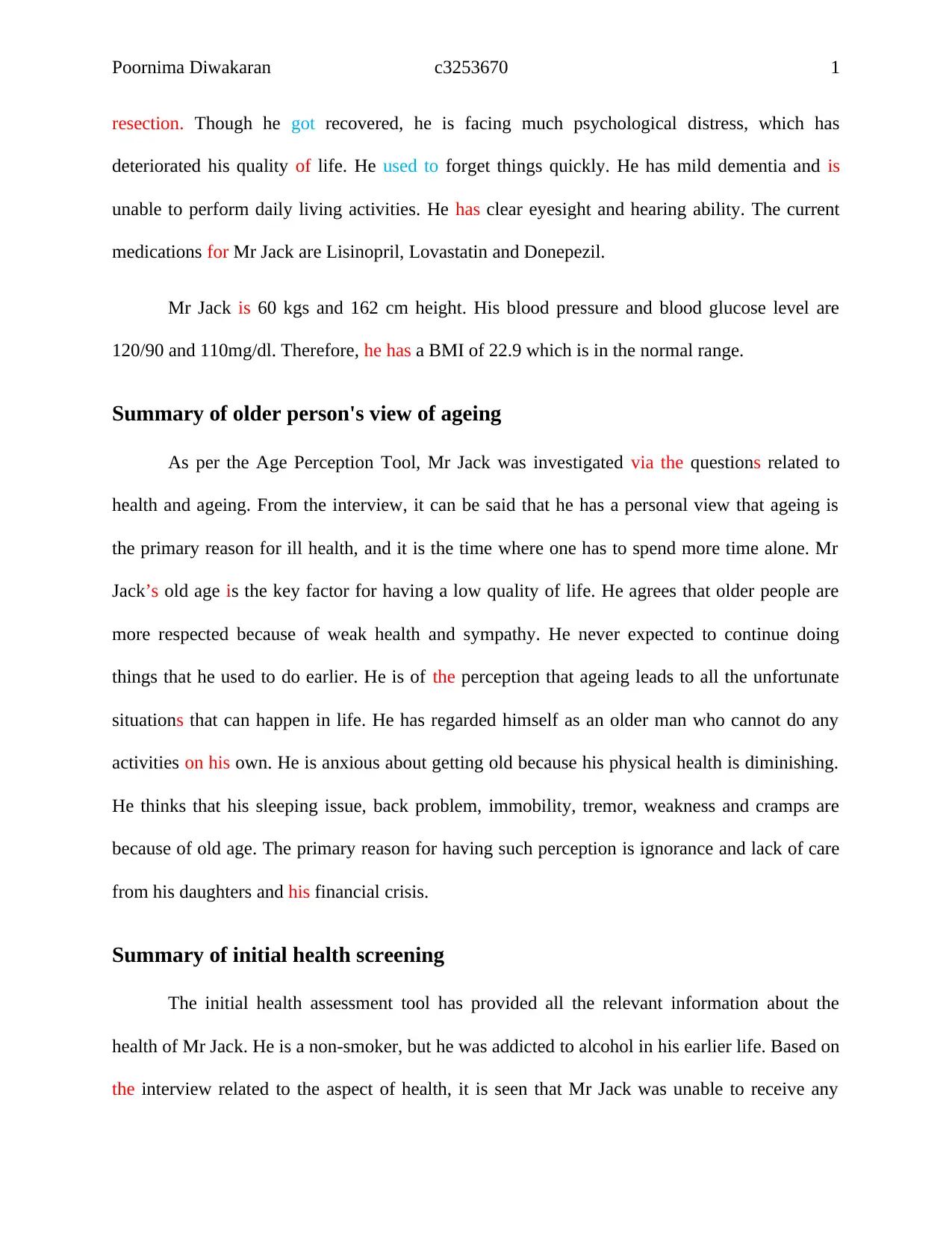
Poornima Diwakaran c3253670
resection. Though he got recovered, he is facing much psychological distress, which has
deteriorated his quality of life. He used to forget things quickly. He has mild dementia and is
unable to perform daily living activities. He has clear eyesight and hearing ability. The current
medications for Mr Jack are Lisinopril, Lovastatin and Donepezil.
Mr Jack is 60 kgs and 162 cm height. His blood pressure and blood glucose level are
120/90 and 110mg/dl. Therefore, he has a BMI of 22.9 which is in the normal range.
Summary of older person's view of ageing
As per the Age Perception Tool, Mr Jack was investigated via the questions related to
health and ageing. From the interview, it can be said that he has a personal view that ageing is
the primary reason for ill health, and it is the time where one has to spend more time alone. Mr
Jack’s old age is the key factor for having a low quality of life. He agrees that older people are
more respected because of weak health and sympathy. He never expected to continue doing
things that he used to do earlier. He is of the perception that ageing leads to all the unfortunate
situations that can happen in life. He has regarded himself as an older man who cannot do any
activities on his own. He is anxious about getting old because his physical health is diminishing.
He thinks that his sleeping issue, back problem, immobility, tremor, weakness and cramps are
because of old age. The primary reason for having such perception is ignorance and lack of care
from his daughters and his financial crisis.
Summary of initial health screening
The initial health assessment tool has provided all the relevant information about the
health of Mr Jack. He is a non-smoker, but he was addicted to alcohol in his earlier life. Based on
the interview related to the aspect of health, it is seen that Mr Jack was unable to receive any
1
resection. Though he got recovered, he is facing much psychological distress, which has
deteriorated his quality of life. He used to forget things quickly. He has mild dementia and is
unable to perform daily living activities. He has clear eyesight and hearing ability. The current
medications for Mr Jack are Lisinopril, Lovastatin and Donepezil.
Mr Jack is 60 kgs and 162 cm height. His blood pressure and blood glucose level are
120/90 and 110mg/dl. Therefore, he has a BMI of 22.9 which is in the normal range.
Summary of older person's view of ageing
As per the Age Perception Tool, Mr Jack was investigated via the questions related to
health and ageing. From the interview, it can be said that he has a personal view that ageing is
the primary reason for ill health, and it is the time where one has to spend more time alone. Mr
Jack’s old age is the key factor for having a low quality of life. He agrees that older people are
more respected because of weak health and sympathy. He never expected to continue doing
things that he used to do earlier. He is of the perception that ageing leads to all the unfortunate
situations that can happen in life. He has regarded himself as an older man who cannot do any
activities on his own. He is anxious about getting old because his physical health is diminishing.
He thinks that his sleeping issue, back problem, immobility, tremor, weakness and cramps are
because of old age. The primary reason for having such perception is ignorance and lack of care
from his daughters and his financial crisis.
Summary of initial health screening
The initial health assessment tool has provided all the relevant information about the
health of Mr Jack. He is a non-smoker, but he was addicted to alcohol in his earlier life. Based on
the interview related to the aspect of health, it is seen that Mr Jack was unable to receive any
1
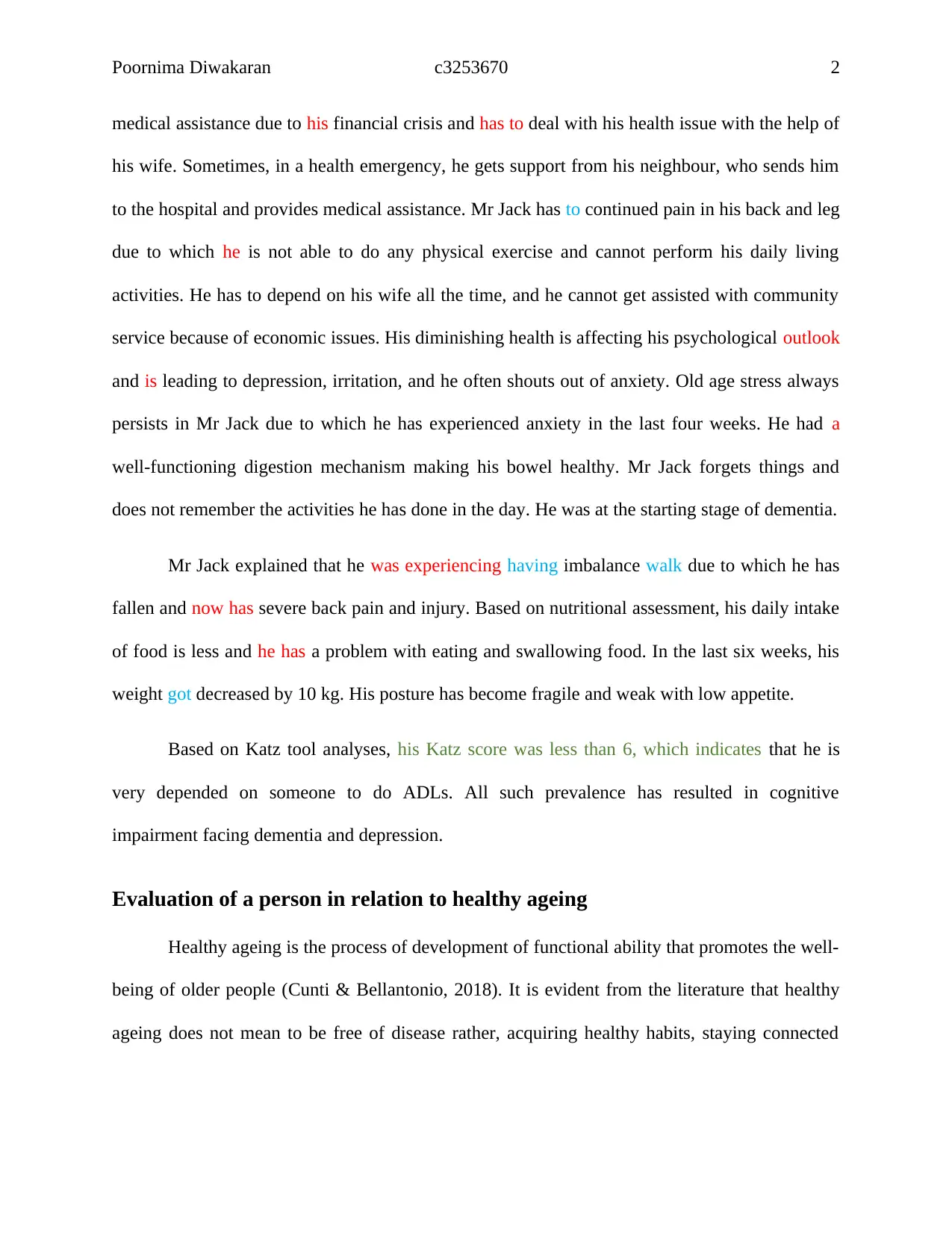
Poornima Diwakaran c3253670
medical assistance due to his financial crisis and has to deal with his health issue with the help of
his wife. Sometimes, in a health emergency, he gets support from his neighbour, who sends him
to the hospital and provides medical assistance. Mr Jack has to continued pain in his back and leg
due to which he is not able to do any physical exercise and cannot perform his daily living
activities. He has to depend on his wife all the time, and he cannot get assisted with community
service because of economic issues. His diminishing health is affecting his psychological outlook
and is leading to depression, irritation, and he often shouts out of anxiety. Old age stress always
persists in Mr Jack due to which he has experienced anxiety in the last four weeks. He had a
well-functioning digestion mechanism making his bowel healthy. Mr Jack forgets things and
does not remember the activities he has done in the day. He was at the starting stage of dementia.
Mr Jack explained that he was experiencing having imbalance walk due to which he has
fallen and now has severe back pain and injury. Based on nutritional assessment, his daily intake
of food is less and he has a problem with eating and swallowing food. In the last six weeks, his
weight got decreased by 10 kg. His posture has become fragile and weak with low appetite.
Based on Katz tool analyses, his Katz score was less than 6, which indicates that he is
very depended on someone to do ADLs. All such prevalence has resulted in cognitive
impairment facing dementia and depression.
Evaluation of a person in relation to healthy ageing
Healthy ageing is the process of development of functional ability that promotes the well-
being of older people (Cunti & Bellantonio, 2018). It is evident from the literature that healthy
ageing does not mean to be free of disease rather, acquiring healthy habits, staying connected
2
medical assistance due to his financial crisis and has to deal with his health issue with the help of
his wife. Sometimes, in a health emergency, he gets support from his neighbour, who sends him
to the hospital and provides medical assistance. Mr Jack has to continued pain in his back and leg
due to which he is not able to do any physical exercise and cannot perform his daily living
activities. He has to depend on his wife all the time, and he cannot get assisted with community
service because of economic issues. His diminishing health is affecting his psychological outlook
and is leading to depression, irritation, and he often shouts out of anxiety. Old age stress always
persists in Mr Jack due to which he has experienced anxiety in the last four weeks. He had a
well-functioning digestion mechanism making his bowel healthy. Mr Jack forgets things and
does not remember the activities he has done in the day. He was at the starting stage of dementia.
Mr Jack explained that he was experiencing having imbalance walk due to which he has
fallen and now has severe back pain and injury. Based on nutritional assessment, his daily intake
of food is less and he has a problem with eating and swallowing food. In the last six weeks, his
weight got decreased by 10 kg. His posture has become fragile and weak with low appetite.
Based on Katz tool analyses, his Katz score was less than 6, which indicates that he is
very depended on someone to do ADLs. All such prevalence has resulted in cognitive
impairment facing dementia and depression.
Evaluation of a person in relation to healthy ageing
Healthy ageing is the process of development of functional ability that promotes the well-
being of older people (Cunti & Bellantonio, 2018). It is evident from the literature that healthy
ageing does not mean to be free of disease rather, acquiring healthy habits, staying connected
2
⊘ This is a preview!⊘
Do you want full access?
Subscribe today to unlock all pages.

Trusted by 1+ million students worldwide
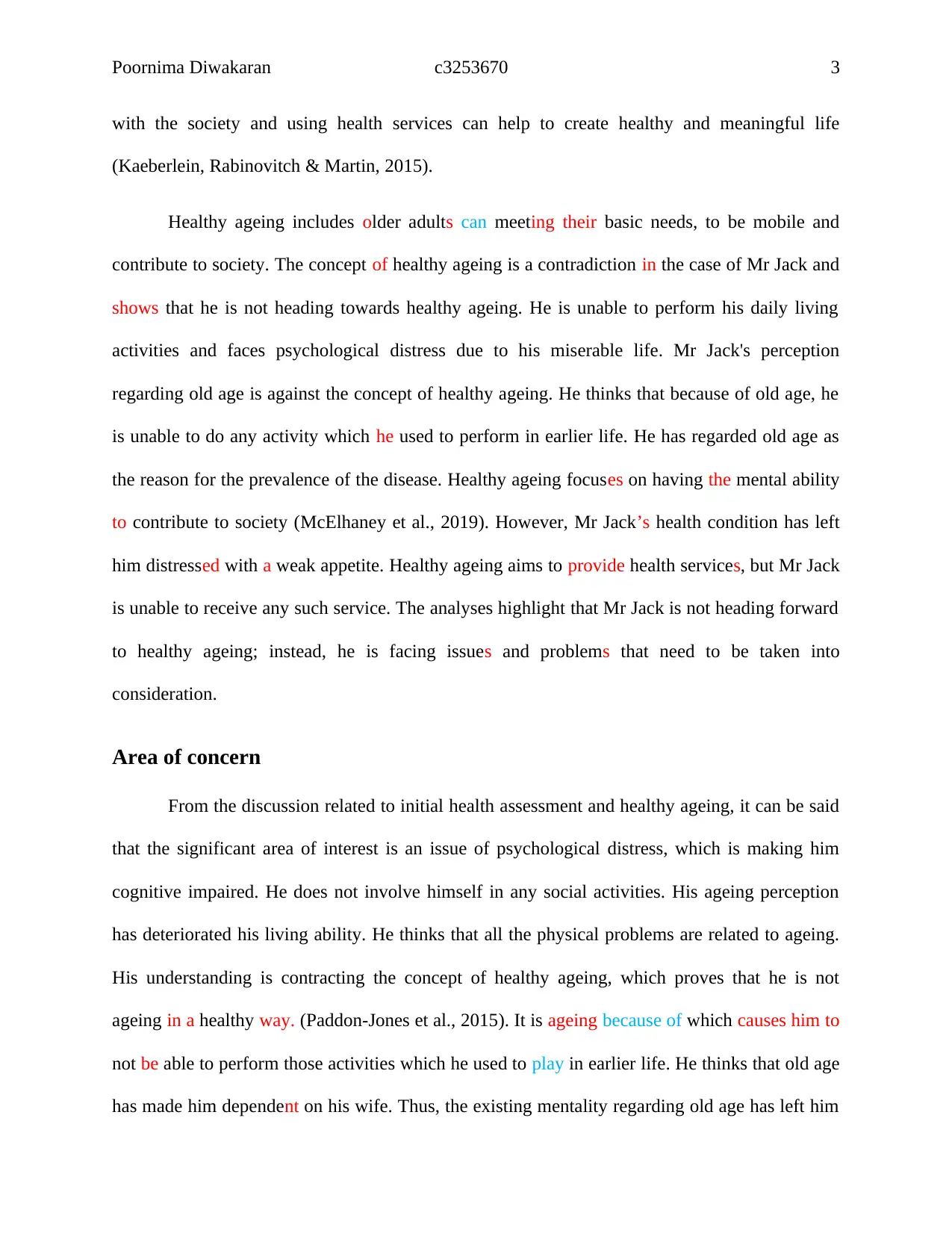
Poornima Diwakaran c3253670
with the society and using health services can help to create healthy and meaningful life
(Kaeberlein, Rabinovitch & Martin, 2015).
Healthy ageing includes older adults can meeting their basic needs, to be mobile and
contribute to society. The concept of healthy ageing is a contradiction in the case of Mr Jack and
shows that he is not heading towards healthy ageing. He is unable to perform his daily living
activities and faces psychological distress due to his miserable life. Mr Jack's perception
regarding old age is against the concept of healthy ageing. He thinks that because of old age, he
is unable to do any activity which he used to perform in earlier life. He has regarded old age as
the reason for the prevalence of the disease. Healthy ageing focuses on having the mental ability
to contribute to society (McElhaney et al., 2019). However, Mr Jack’s health condition has left
him distressed with a weak appetite. Healthy ageing aims to provide health services, but Mr Jack
is unable to receive any such service. The analyses highlight that Mr Jack is not heading forward
to healthy ageing; instead, he is facing issues and problems that need to be taken into
consideration.
Area of concern
From the discussion related to initial health assessment and healthy ageing, it can be said
that the significant area of interest is an issue of psychological distress, which is making him
cognitive impaired. He does not involve himself in any social activities. His ageing perception
has deteriorated his living ability. He thinks that all the physical problems are related to ageing.
His understanding is contracting the concept of healthy ageing, which proves that he is not
ageing in a healthy way. (Paddon-Jones et al., 2015). It is ageing because of which causes him to
not be able to perform those activities which he used to play in earlier life. He thinks that old age
has made him dependent on his wife. Thus, the existing mentality regarding old age has left him
3
with the society and using health services can help to create healthy and meaningful life
(Kaeberlein, Rabinovitch & Martin, 2015).
Healthy ageing includes older adults can meeting their basic needs, to be mobile and
contribute to society. The concept of healthy ageing is a contradiction in the case of Mr Jack and
shows that he is not heading towards healthy ageing. He is unable to perform his daily living
activities and faces psychological distress due to his miserable life. Mr Jack's perception
regarding old age is against the concept of healthy ageing. He thinks that because of old age, he
is unable to do any activity which he used to perform in earlier life. He has regarded old age as
the reason for the prevalence of the disease. Healthy ageing focuses on having the mental ability
to contribute to society (McElhaney et al., 2019). However, Mr Jack’s health condition has left
him distressed with a weak appetite. Healthy ageing aims to provide health services, but Mr Jack
is unable to receive any such service. The analyses highlight that Mr Jack is not heading forward
to healthy ageing; instead, he is facing issues and problems that need to be taken into
consideration.
Area of concern
From the discussion related to initial health assessment and healthy ageing, it can be said
that the significant area of interest is an issue of psychological distress, which is making him
cognitive impaired. He does not involve himself in any social activities. His ageing perception
has deteriorated his living ability. He thinks that all the physical problems are related to ageing.
His understanding is contracting the concept of healthy ageing, which proves that he is not
ageing in a healthy way. (Paddon-Jones et al., 2015). It is ageing because of which causes him to
not be able to perform those activities which he used to play in earlier life. He thinks that old age
has made him dependent on his wife. Thus, the existing mentality regarding old age has left him
3
Paraphrase This Document
Need a fresh take? Get an instant paraphrase of this document with our AI Paraphraser
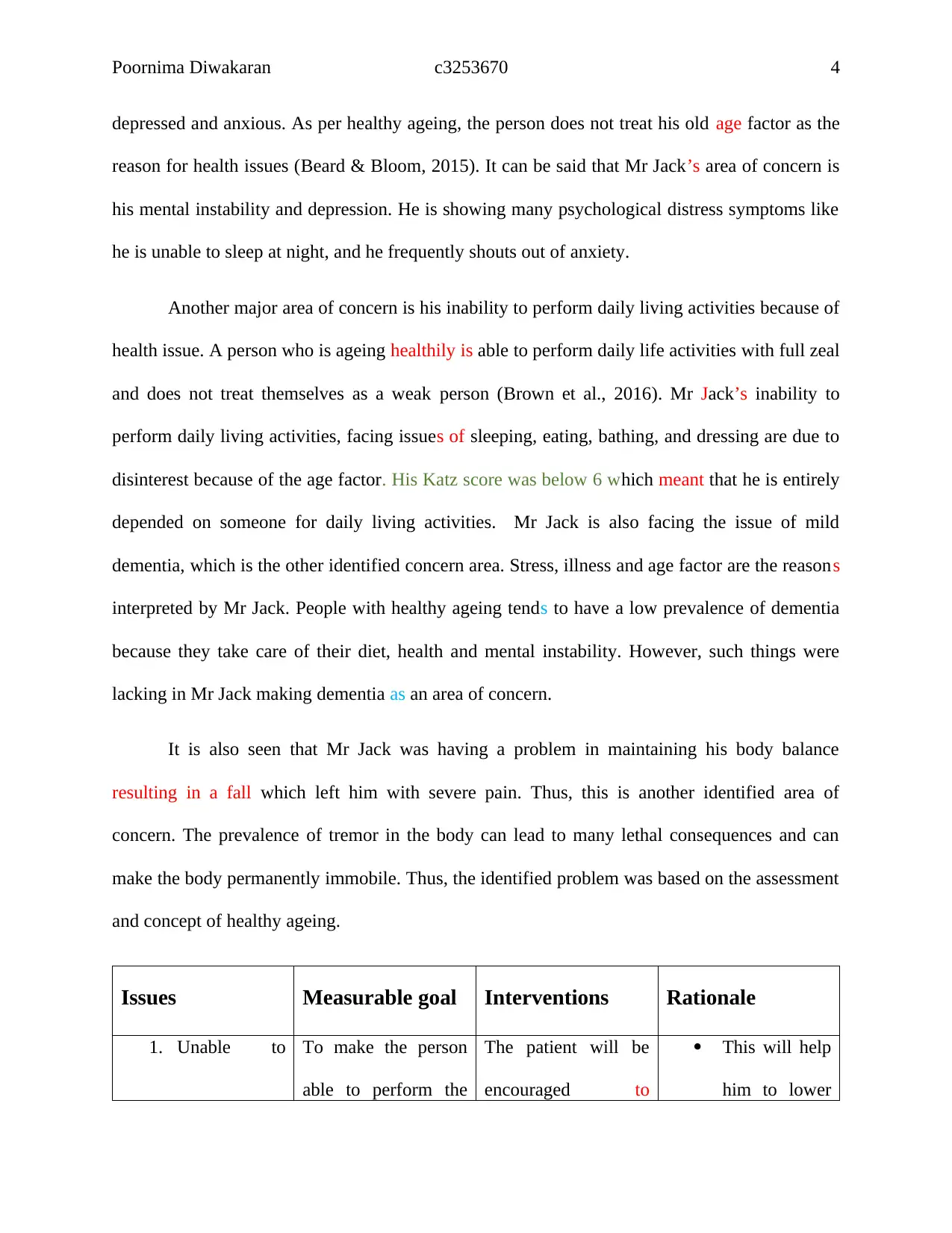
Poornima Diwakaran c3253670
depressed and anxious. As per healthy ageing, the person does not treat his old age factor as the
reason for health issues (Beard & Bloom, 2015). It can be said that Mr Jack’s area of concern is
his mental instability and depression. He is showing many psychological distress symptoms like
he is unable to sleep at night, and he frequently shouts out of anxiety.
Another major area of concern is his inability to perform daily living activities because of
health issue. A person who is ageing healthily is able to perform daily life activities with full zeal
and does not treat themselves as a weak person (Brown et al., 2016). Mr Jack’s inability to
perform daily living activities, facing issues of sleeping, eating, bathing, and dressing are due to
disinterest because of the age factor. His Katz score was below 6 which meant that he is entirely
depended on someone for daily living activities. Mr Jack is also facing the issue of mild
dementia, which is the other identified concern area. Stress, illness and age factor are the reasons
interpreted by Mr Jack. People with healthy ageing tends to have a low prevalence of dementia
because they take care of their diet, health and mental instability. However, such things were
lacking in Mr Jack making dementia as an area of concern.
It is also seen that Mr Jack was having a problem in maintaining his body balance
resulting in a fall which left him with severe pain. Thus, this is another identified area of
concern. The prevalence of tremor in the body can lead to many lethal consequences and can
make the body permanently immobile. Thus, the identified problem was based on the assessment
and concept of healthy ageing.
Issues Measurable goal Interventions Rationale
1. Unable to To make the person
able to perform the
The patient will be
encouraged to
This will help
him to lower
4
depressed and anxious. As per healthy ageing, the person does not treat his old age factor as the
reason for health issues (Beard & Bloom, 2015). It can be said that Mr Jack’s area of concern is
his mental instability and depression. He is showing many psychological distress symptoms like
he is unable to sleep at night, and he frequently shouts out of anxiety.
Another major area of concern is his inability to perform daily living activities because of
health issue. A person who is ageing healthily is able to perform daily life activities with full zeal
and does not treat themselves as a weak person (Brown et al., 2016). Mr Jack’s inability to
perform daily living activities, facing issues of sleeping, eating, bathing, and dressing are due to
disinterest because of the age factor. His Katz score was below 6 which meant that he is entirely
depended on someone for daily living activities. Mr Jack is also facing the issue of mild
dementia, which is the other identified concern area. Stress, illness and age factor are the reasons
interpreted by Mr Jack. People with healthy ageing tends to have a low prevalence of dementia
because they take care of their diet, health and mental instability. However, such things were
lacking in Mr Jack making dementia as an area of concern.
It is also seen that Mr Jack was having a problem in maintaining his body balance
resulting in a fall which left him with severe pain. Thus, this is another identified area of
concern. The prevalence of tremor in the body can lead to many lethal consequences and can
make the body permanently immobile. Thus, the identified problem was based on the assessment
and concept of healthy ageing.
Issues Measurable goal Interventions Rationale
1. Unable to To make the person
able to perform the
The patient will be
encouraged to
This will help
him to lower
4
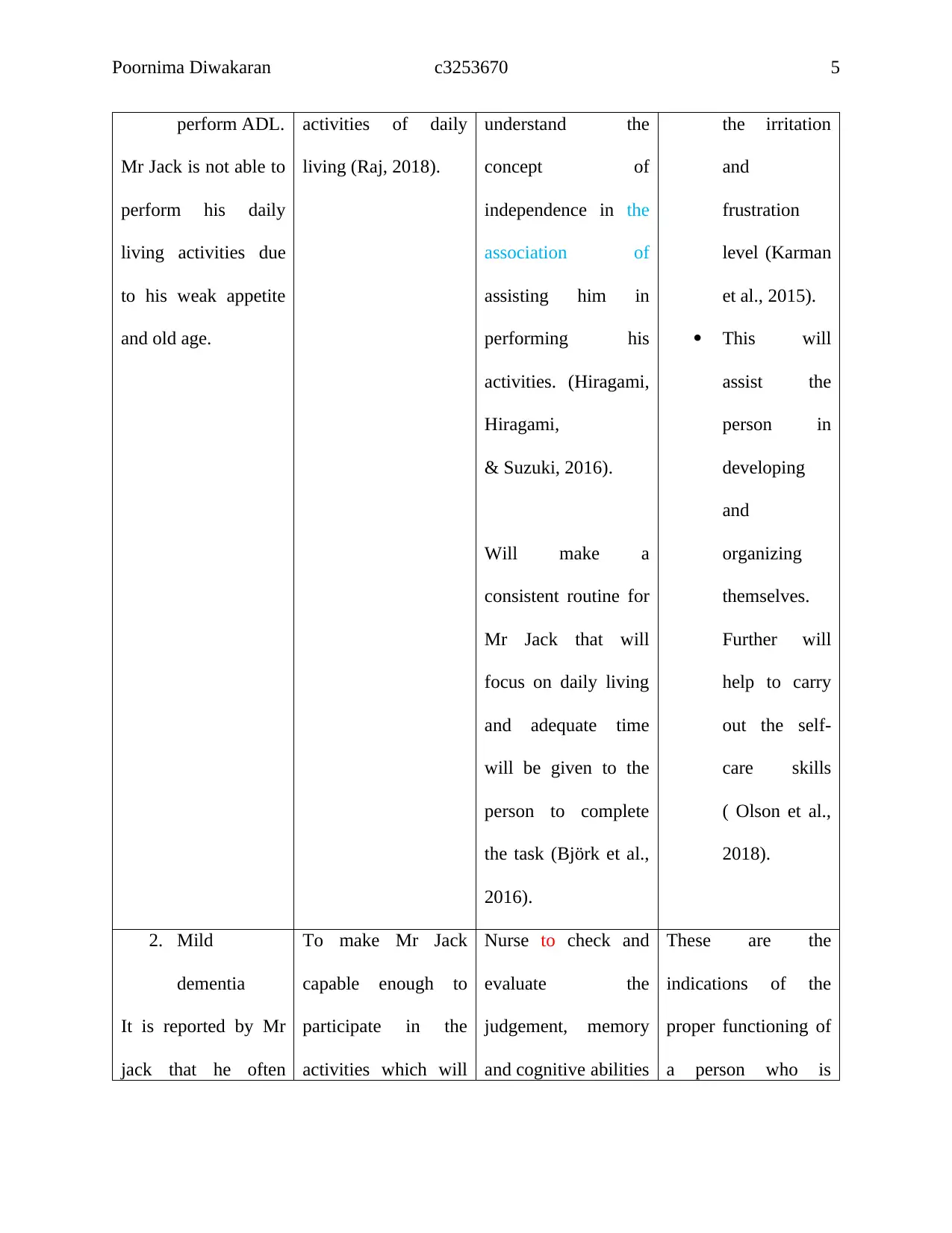
Poornima Diwakaran c3253670
perform ADL.
Mr Jack is not able to
perform his daily
living activities due
to his weak appetite
and old age.
activities of daily
living (Raj, 2018).
understand the
concept of
independence in the
association of
assisting him in
performing his
activities. (Hiragami,
Hiragami,
& Suzuki, 2016).
Will make a
consistent routine for
Mr Jack that will
focus on daily living
and adequate time
will be given to the
person to complete
the task (Björk et al.,
2016).
the irritation
and
frustration
level (Karman
et al., 2015).
This will
assist the
person in
developing
and
organizing
themselves.
Further will
help to carry
out the self-
care skills
( Olson et al.,
2018).
2. Mild
dementia
It is reported by Mr
jack that he often
To make Mr Jack
capable enough to
participate in the
activities which will
Nurse to check and
evaluate the
judgement, memory
and cognitive abilities
These are the
indications of the
proper functioning of
a person who is
5
perform ADL.
Mr Jack is not able to
perform his daily
living activities due
to his weak appetite
and old age.
activities of daily
living (Raj, 2018).
understand the
concept of
independence in the
association of
assisting him in
performing his
activities. (Hiragami,
Hiragami,
& Suzuki, 2016).
Will make a
consistent routine for
Mr Jack that will
focus on daily living
and adequate time
will be given to the
person to complete
the task (Björk et al.,
2016).
the irritation
and
frustration
level (Karman
et al., 2015).
This will
assist the
person in
developing
and
organizing
themselves.
Further will
help to carry
out the self-
care skills
( Olson et al.,
2018).
2. Mild
dementia
It is reported by Mr
jack that he often
To make Mr Jack
capable enough to
participate in the
activities which will
Nurse to check and
evaluate the
judgement, memory
and cognitive abilities
These are the
indications of the
proper functioning of
a person who is
5
⊘ This is a preview!⊘
Do you want full access?
Subscribe today to unlock all pages.

Trusted by 1+ million students worldwide
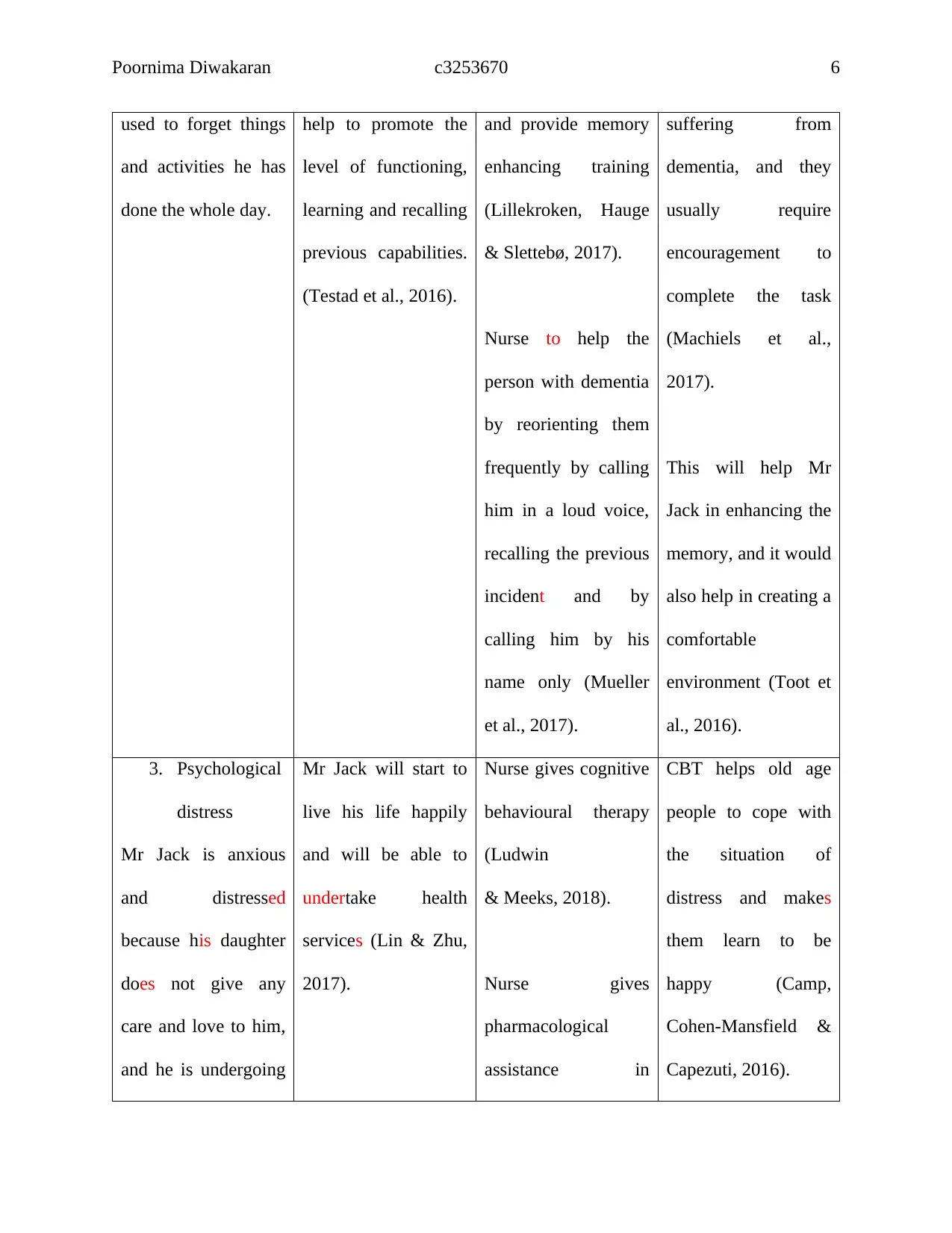
Poornima Diwakaran c3253670
used to forget things
and activities he has
done the whole day.
help to promote the
level of functioning,
learning and recalling
previous capabilities.
(Testad et al., 2016).
and provide memory
enhancing training
(Lillekroken, Hauge
& Slettebø, 2017).
Nurse to help the
person with dementia
by reorienting them
frequently by calling
him in a loud voice,
recalling the previous
incident and by
calling him by his
name only (Mueller
et al., 2017).
suffering from
dementia, and they
usually require
encouragement to
complete the task
(Machiels et al.,
2017).
This will help Mr
Jack in enhancing the
memory, and it would
also help in creating a
comfortable
environment (Toot et
al., 2016).
3. Psychological
distress
Mr Jack is anxious
and distressed
because his daughter
does not give any
care and love to him,
and he is undergoing
Mr Jack will start to
live his life happily
and will be able to
undertake health
services (Lin & Zhu,
2017).
Nurse gives cognitive
behavioural therapy
(Ludwin
& Meeks, 2018).
Nurse gives
pharmacological
assistance in
CBT helps old age
people to cope with
the situation of
distress and makes
them learn to be
happy (Camp,
Cohen-Mansfield &
Capezuti, 2016).
6
used to forget things
and activities he has
done the whole day.
help to promote the
level of functioning,
learning and recalling
previous capabilities.
(Testad et al., 2016).
and provide memory
enhancing training
(Lillekroken, Hauge
& Slettebø, 2017).
Nurse to help the
person with dementia
by reorienting them
frequently by calling
him in a loud voice,
recalling the previous
incident and by
calling him by his
name only (Mueller
et al., 2017).
suffering from
dementia, and they
usually require
encouragement to
complete the task
(Machiels et al.,
2017).
This will help Mr
Jack in enhancing the
memory, and it would
also help in creating a
comfortable
environment (Toot et
al., 2016).
3. Psychological
distress
Mr Jack is anxious
and distressed
because his daughter
does not give any
care and love to him,
and he is undergoing
Mr Jack will start to
live his life happily
and will be able to
undertake health
services (Lin & Zhu,
2017).
Nurse gives cognitive
behavioural therapy
(Ludwin
& Meeks, 2018).
Nurse gives
pharmacological
assistance in
CBT helps old age
people to cope with
the situation of
distress and makes
them learn to be
happy (Camp,
Cohen-Mansfield &
Capezuti, 2016).
6
Paraphrase This Document
Need a fresh take? Get an instant paraphrase of this document with our AI Paraphraser
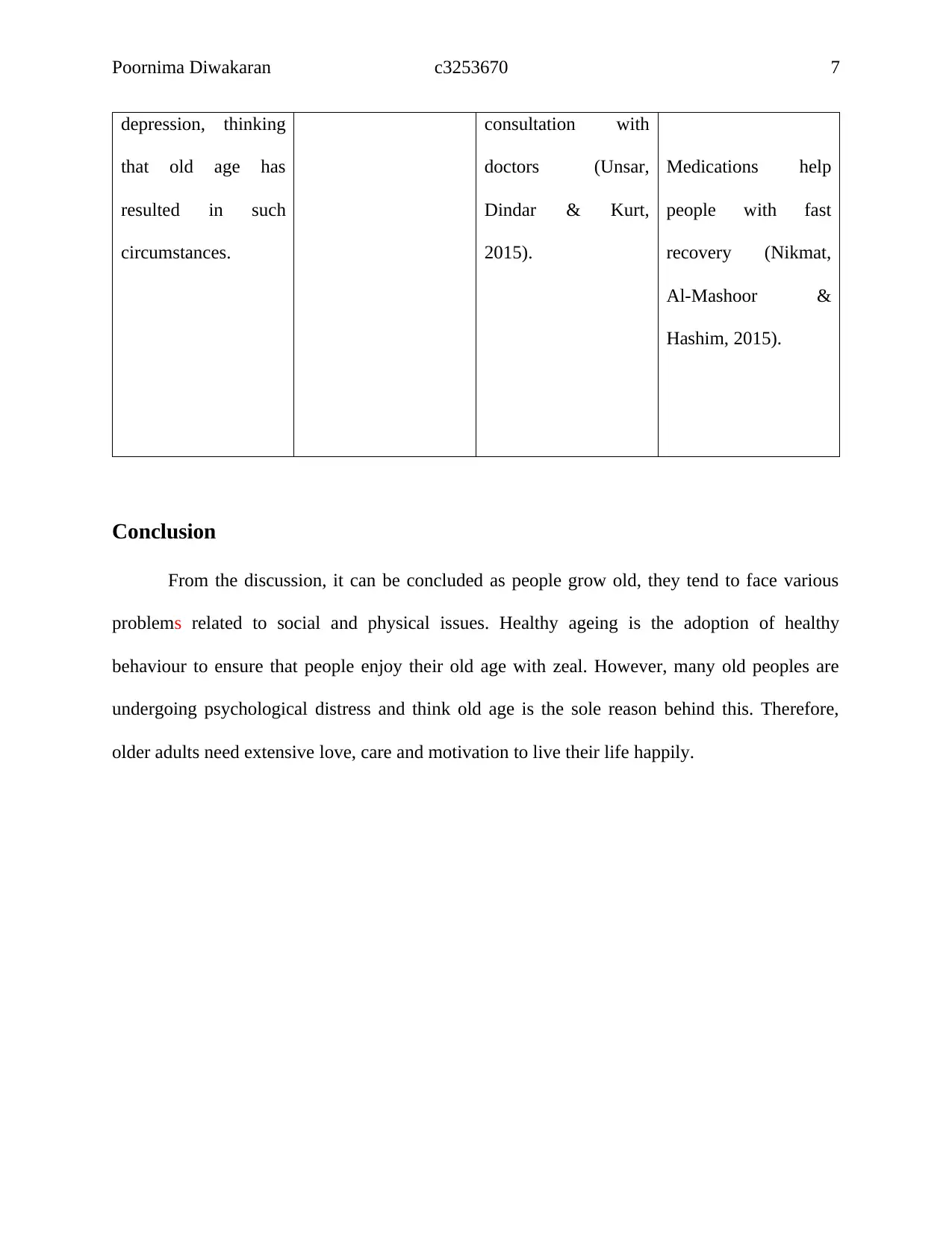
Poornima Diwakaran c3253670
depression, thinking
that old age has
resulted in such
circumstances.
consultation with
doctors (Unsar,
Dindar & Kurt,
2015).
Medications help
people with fast
recovery (Nikmat,
Al-Mashoor &
Hashim, 2015).
Conclusion
From the discussion, it can be concluded as people grow old, they tend to face various
problems related to social and physical issues. Healthy ageing is the adoption of healthy
behaviour to ensure that people enjoy their old age with zeal. However, many old peoples are
undergoing psychological distress and think old age is the sole reason behind this. Therefore,
older adults need extensive love, care and motivation to live their life happily.
7
depression, thinking
that old age has
resulted in such
circumstances.
consultation with
doctors (Unsar,
Dindar & Kurt,
2015).
Medications help
people with fast
recovery (Nikmat,
Al-Mashoor &
Hashim, 2015).
Conclusion
From the discussion, it can be concluded as people grow old, they tend to face various
problems related to social and physical issues. Healthy ageing is the adoption of healthy
behaviour to ensure that people enjoy their old age with zeal. However, many old peoples are
undergoing psychological distress and think old age is the sole reason behind this. Therefore,
older adults need extensive love, care and motivation to live their life happily.
7
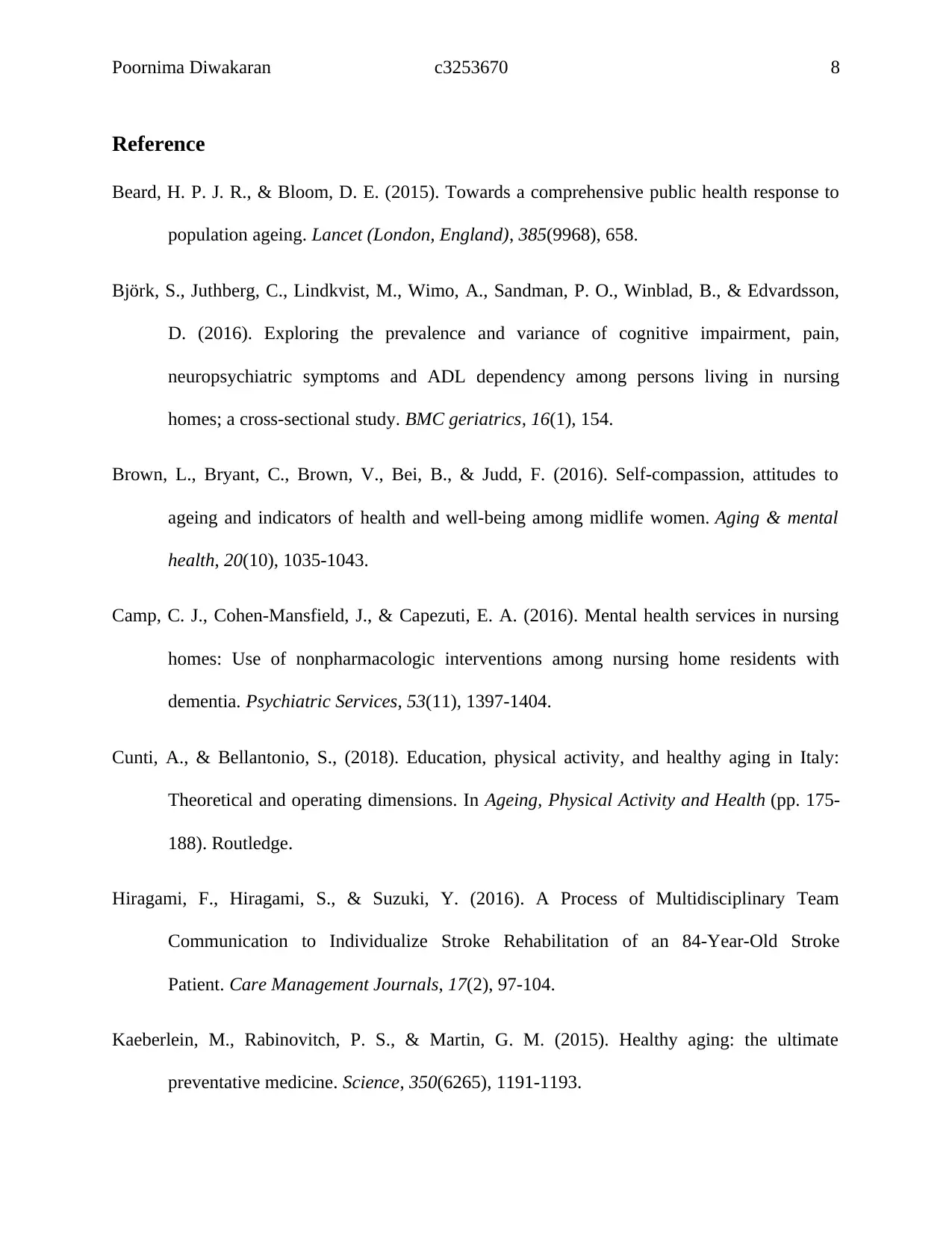
Poornima Diwakaran c3253670
Reference
Beard, H. P. J. R., & Bloom, D. E. (2015). Towards a comprehensive public health response to
population ageing. Lancet (London, England), 385(9968), 658.
Björk, S., Juthberg, C., Lindkvist, M., Wimo, A., Sandman, P. O., Winblad, B., & Edvardsson,
D. (2016). Exploring the prevalence and variance of cognitive impairment, pain,
neuropsychiatric symptoms and ADL dependency among persons living in nursing
homes; a cross-sectional study. BMC geriatrics, 16(1), 154.
Brown, L., Bryant, C., Brown, V., Bei, B., & Judd, F. (2016). Self-compassion, attitudes to
ageing and indicators of health and well-being among midlife women. Aging & mental
health, 20(10), 1035-1043.
Camp, C. J., Cohen-Mansfield, J., & Capezuti, E. A. (2016). Mental health services in nursing
homes: Use of nonpharmacologic interventions among nursing home residents with
dementia. Psychiatric Services, 53(11), 1397-1404.
Cunti, A., & Bellantonio, S., (2018). Education, physical activity, and healthy aging in Italy:
Theoretical and operating dimensions. In Ageing, Physical Activity and Health (pp. 175-
188). Routledge.
Hiragami, F., Hiragami, S., & Suzuki, Y. (2016). A Process of Multidisciplinary Team
Communication to Individualize Stroke Rehabilitation of an 84-Year-Old Stroke
Patient. Care Management Journals, 17(2), 97-104.
Kaeberlein, M., Rabinovitch, P. S., & Martin, G. M. (2015). Healthy aging: the ultimate
preventative medicine. Science, 350(6265), 1191-1193.
8
Reference
Beard, H. P. J. R., & Bloom, D. E. (2015). Towards a comprehensive public health response to
population ageing. Lancet (London, England), 385(9968), 658.
Björk, S., Juthberg, C., Lindkvist, M., Wimo, A., Sandman, P. O., Winblad, B., & Edvardsson,
D. (2016). Exploring the prevalence and variance of cognitive impairment, pain,
neuropsychiatric symptoms and ADL dependency among persons living in nursing
homes; a cross-sectional study. BMC geriatrics, 16(1), 154.
Brown, L., Bryant, C., Brown, V., Bei, B., & Judd, F. (2016). Self-compassion, attitudes to
ageing and indicators of health and well-being among midlife women. Aging & mental
health, 20(10), 1035-1043.
Camp, C. J., Cohen-Mansfield, J., & Capezuti, E. A. (2016). Mental health services in nursing
homes: Use of nonpharmacologic interventions among nursing home residents with
dementia. Psychiatric Services, 53(11), 1397-1404.
Cunti, A., & Bellantonio, S., (2018). Education, physical activity, and healthy aging in Italy:
Theoretical and operating dimensions. In Ageing, Physical Activity and Health (pp. 175-
188). Routledge.
Hiragami, F., Hiragami, S., & Suzuki, Y. (2016). A Process of Multidisciplinary Team
Communication to Individualize Stroke Rehabilitation of an 84-Year-Old Stroke
Patient. Care Management Journals, 17(2), 97-104.
Kaeberlein, M., Rabinovitch, P. S., & Martin, G. M. (2015). Healthy aging: the ultimate
preventative medicine. Science, 350(6265), 1191-1193.
8
⊘ This is a preview!⊘
Do you want full access?
Subscribe today to unlock all pages.

Trusted by 1+ million students worldwide
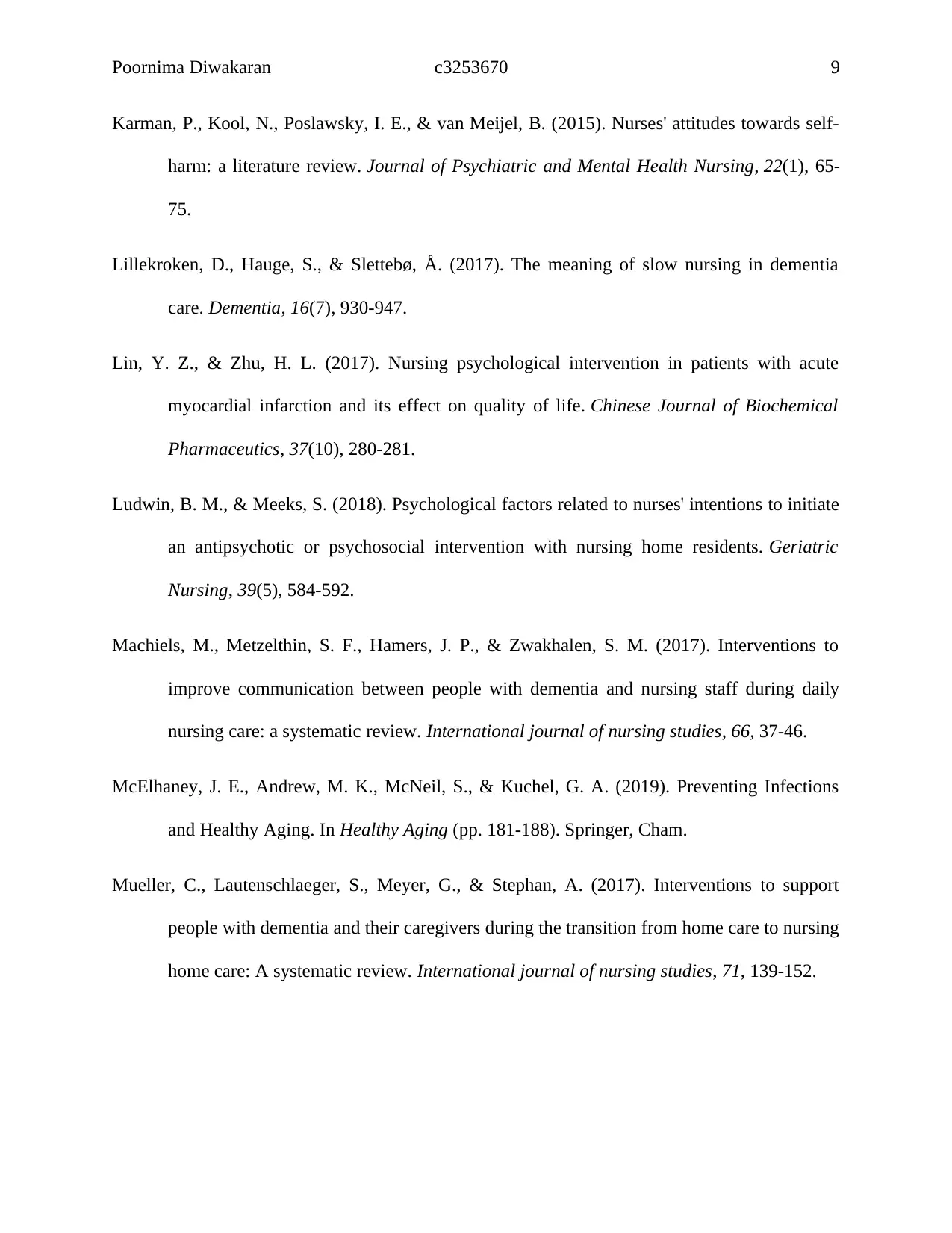
Poornima Diwakaran c3253670
Karman, P., Kool, N., Poslawsky, I. E., & van Meijel, B. (2015). Nurses' attitudes towards self‐
harm: a literature review. Journal of Psychiatric and Mental Health Nursing, 22(1), 65-
75.
Lillekroken, D., Hauge, S., & Slettebø, Å. (2017). The meaning of slow nursing in dementia
care. Dementia, 16(7), 930-947.
Lin, Y. Z., & Zhu, H. L. (2017). Nursing psychological intervention in patients with acute
myocardial infarction and its effect on quality of life. Chinese Journal of Biochemical
Pharmaceutics, 37(10), 280-281.
Ludwin, B. M., & Meeks, S. (2018). Psychological factors related to nurses' intentions to initiate
an antipsychotic or psychosocial intervention with nursing home residents. Geriatric
Nursing, 39(5), 584-592.
Machiels, M., Metzelthin, S. F., Hamers, J. P., & Zwakhalen, S. M. (2017). Interventions to
improve communication between people with dementia and nursing staff during daily
nursing care: a systematic review. International journal of nursing studies, 66, 37-46.
McElhaney, J. E., Andrew, M. K., McNeil, S., & Kuchel, G. A. (2019). Preventing Infections
and Healthy Aging. In Healthy Aging (pp. 181-188). Springer, Cham.
Mueller, C., Lautenschlaeger, S., Meyer, G., & Stephan, A. (2017). Interventions to support
people with dementia and their caregivers during the transition from home care to nursing
home care: A systematic review. International journal of nursing studies, 71, 139-152.
9
Karman, P., Kool, N., Poslawsky, I. E., & van Meijel, B. (2015). Nurses' attitudes towards self‐
harm: a literature review. Journal of Psychiatric and Mental Health Nursing, 22(1), 65-
75.
Lillekroken, D., Hauge, S., & Slettebø, Å. (2017). The meaning of slow nursing in dementia
care. Dementia, 16(7), 930-947.
Lin, Y. Z., & Zhu, H. L. (2017). Nursing psychological intervention in patients with acute
myocardial infarction and its effect on quality of life. Chinese Journal of Biochemical
Pharmaceutics, 37(10), 280-281.
Ludwin, B. M., & Meeks, S. (2018). Psychological factors related to nurses' intentions to initiate
an antipsychotic or psychosocial intervention with nursing home residents. Geriatric
Nursing, 39(5), 584-592.
Machiels, M., Metzelthin, S. F., Hamers, J. P., & Zwakhalen, S. M. (2017). Interventions to
improve communication between people with dementia and nursing staff during daily
nursing care: a systematic review. International journal of nursing studies, 66, 37-46.
McElhaney, J. E., Andrew, M. K., McNeil, S., & Kuchel, G. A. (2019). Preventing Infections
and Healthy Aging. In Healthy Aging (pp. 181-188). Springer, Cham.
Mueller, C., Lautenschlaeger, S., Meyer, G., & Stephan, A. (2017). Interventions to support
people with dementia and their caregivers during the transition from home care to nursing
home care: A systematic review. International journal of nursing studies, 71, 139-152.
9
Paraphrase This Document
Need a fresh take? Get an instant paraphrase of this document with our AI Paraphraser
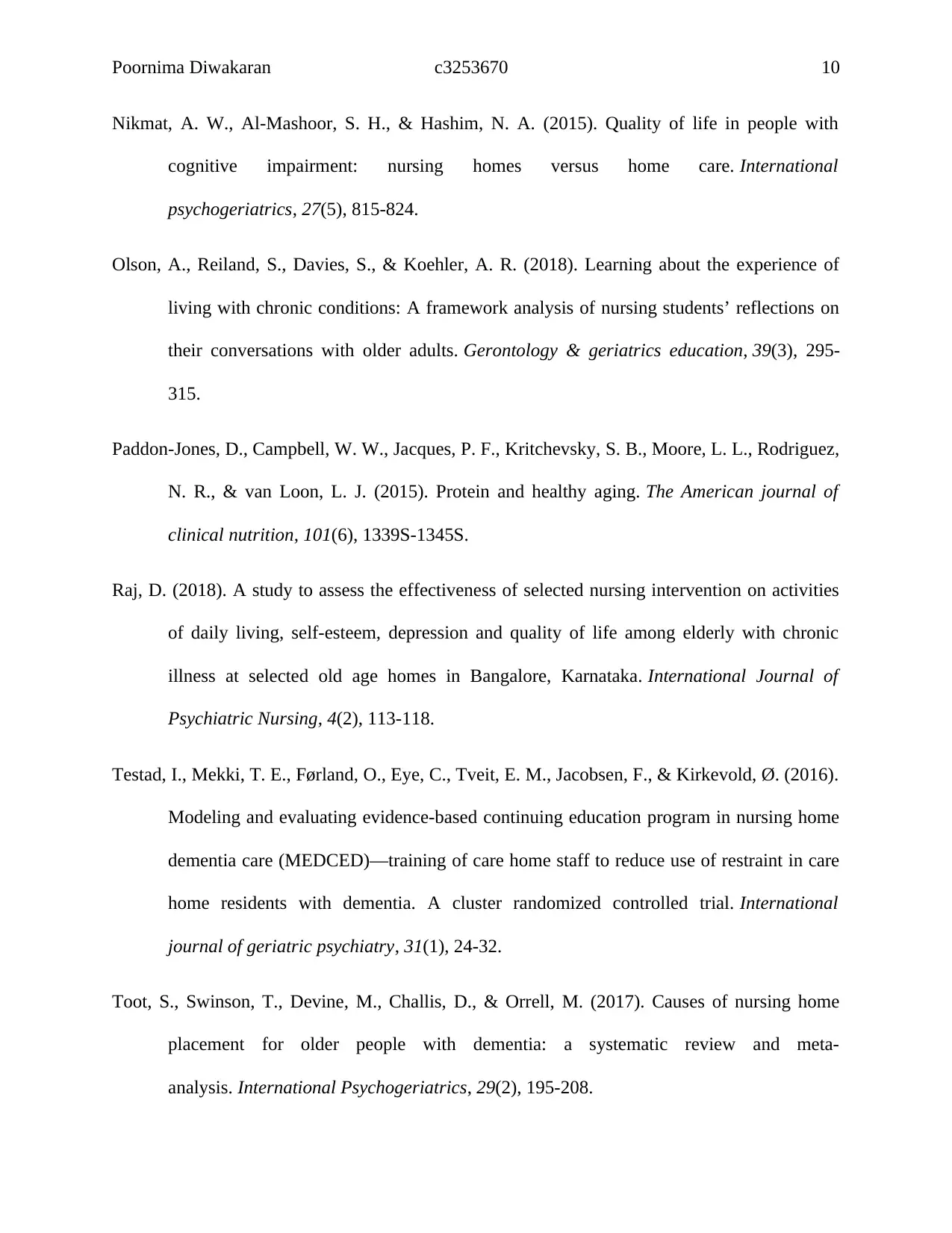
Poornima Diwakaran c3253670
Nikmat, A. W., Al-Mashoor, S. H., & Hashim, N. A. (2015). Quality of life in people with
cognitive impairment: nursing homes versus home care. International
psychogeriatrics, 27(5), 815-824.
Olson, A., Reiland, S., Davies, S., & Koehler, A. R. (2018). Learning about the experience of
living with chronic conditions: A framework analysis of nursing students’ reflections on
their conversations with older adults. Gerontology & geriatrics education, 39(3), 295-
315.
Paddon-Jones, D., Campbell, W. W., Jacques, P. F., Kritchevsky, S. B., Moore, L. L., Rodriguez,
N. R., & van Loon, L. J. (2015). Protein and healthy aging. The American journal of
clinical nutrition, 101(6), 1339S-1345S.
Raj, D. (2018). A study to assess the effectiveness of selected nursing intervention on activities
of daily living, self-esteem, depression and quality of life among elderly with chronic
illness at selected old age homes in Bangalore, Karnataka. International Journal of
Psychiatric Nursing, 4(2), 113-118.
Testad, I., Mekki, T. E., Førland, O., Eye, C., Tveit, E. M., Jacobsen, F., & Kirkevold, Ø. (2016).
Modeling and evaluating evidence‐based continuing education program in nursing home
dementia care (MEDCED)—training of care home staff to reduce use of restraint in care
home residents with dementia. A cluster randomized controlled trial. International
journal of geriatric psychiatry, 31(1), 24-32.
Toot, S., Swinson, T., Devine, M., Challis, D., & Orrell, M. (2017). Causes of nursing home
placement for older people with dementia: a systematic review and meta-
analysis. International Psychogeriatrics, 29(2), 195-208.
10
Nikmat, A. W., Al-Mashoor, S. H., & Hashim, N. A. (2015). Quality of life in people with
cognitive impairment: nursing homes versus home care. International
psychogeriatrics, 27(5), 815-824.
Olson, A., Reiland, S., Davies, S., & Koehler, A. R. (2018). Learning about the experience of
living with chronic conditions: A framework analysis of nursing students’ reflections on
their conversations with older adults. Gerontology & geriatrics education, 39(3), 295-
315.
Paddon-Jones, D., Campbell, W. W., Jacques, P. F., Kritchevsky, S. B., Moore, L. L., Rodriguez,
N. R., & van Loon, L. J. (2015). Protein and healthy aging. The American journal of
clinical nutrition, 101(6), 1339S-1345S.
Raj, D. (2018). A study to assess the effectiveness of selected nursing intervention on activities
of daily living, self-esteem, depression and quality of life among elderly with chronic
illness at selected old age homes in Bangalore, Karnataka. International Journal of
Psychiatric Nursing, 4(2), 113-118.
Testad, I., Mekki, T. E., Førland, O., Eye, C., Tveit, E. M., Jacobsen, F., & Kirkevold, Ø. (2016).
Modeling and evaluating evidence‐based continuing education program in nursing home
dementia care (MEDCED)—training of care home staff to reduce use of restraint in care
home residents with dementia. A cluster randomized controlled trial. International
journal of geriatric psychiatry, 31(1), 24-32.
Toot, S., Swinson, T., Devine, M., Challis, D., & Orrell, M. (2017). Causes of nursing home
placement for older people with dementia: a systematic review and meta-
analysis. International Psychogeriatrics, 29(2), 195-208.
10
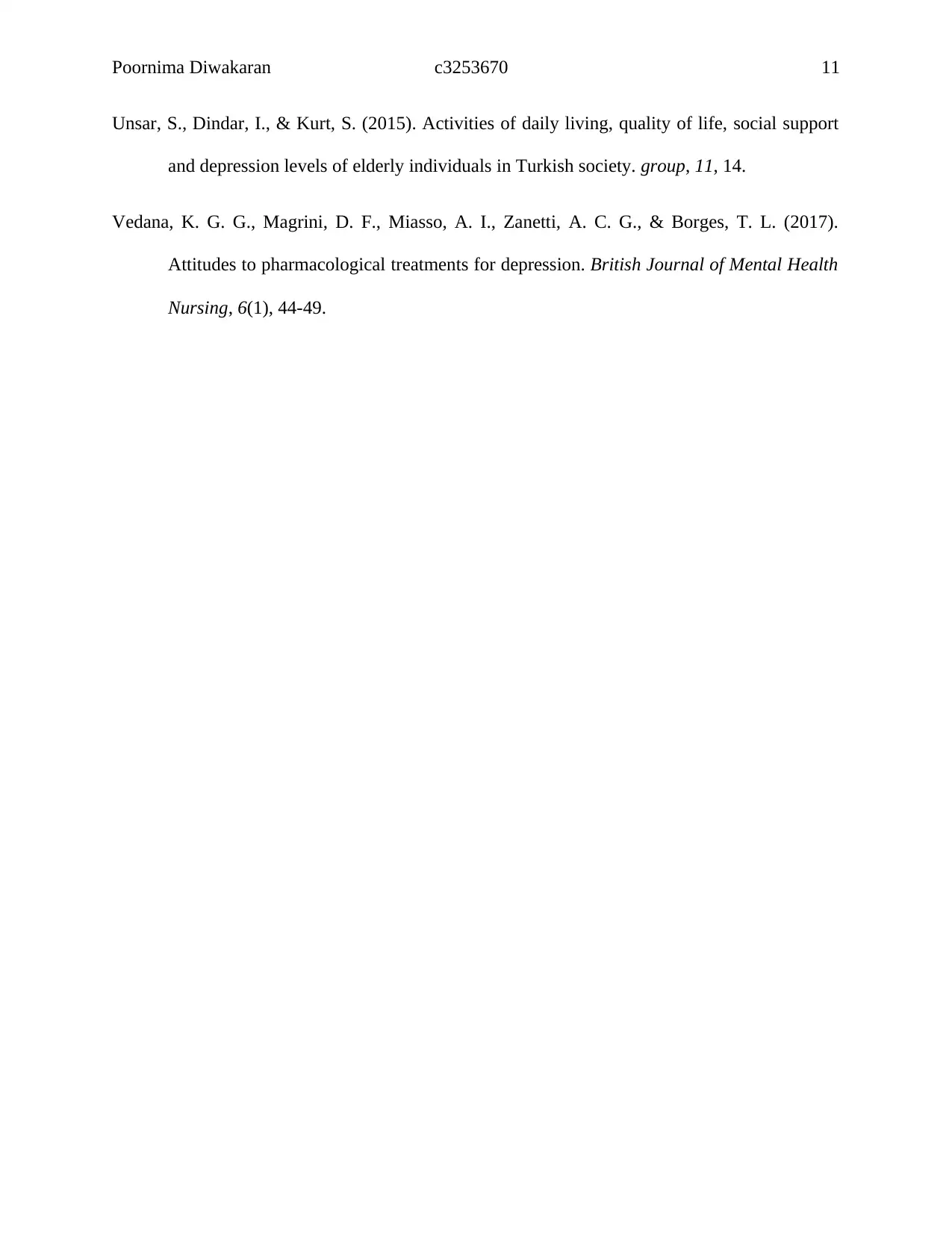
Poornima Diwakaran c3253670
Unsar, S., Dindar, I., & Kurt, S. (2015). Activities of daily living, quality of life, social support
and depression levels of elderly individuals in Turkish society. group, 11, 14.
Vedana, K. G. G., Magrini, D. F., Miasso, A. I., Zanetti, A. C. G., & Borges, T. L. (2017).
Attitudes to pharmacological treatments for depression. British Journal of Mental Health
Nursing, 6(1), 44-49.
11
Unsar, S., Dindar, I., & Kurt, S. (2015). Activities of daily living, quality of life, social support
and depression levels of elderly individuals in Turkish society. group, 11, 14.
Vedana, K. G. G., Magrini, D. F., Miasso, A. I., Zanetti, A. C. G., & Borges, T. L. (2017).
Attitudes to pharmacological treatments for depression. British Journal of Mental Health
Nursing, 6(1), 44-49.
11
⊘ This is a preview!⊘
Do you want full access?
Subscribe today to unlock all pages.

Trusted by 1+ million students worldwide
1 out of 12
Related Documents
Your All-in-One AI-Powered Toolkit for Academic Success.
+13062052269
info@desklib.com
Available 24*7 on WhatsApp / Email
![[object Object]](/_next/static/media/star-bottom.7253800d.svg)
Unlock your academic potential
Copyright © 2020–2026 A2Z Services. All Rights Reserved. Developed and managed by ZUCOL.



